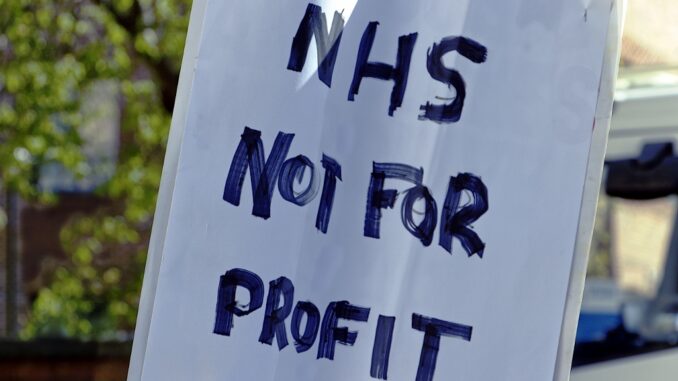
In 2020, the Government contracted the private healthcare sector to support the NHS in battling the pandemic; yet the private sector prioritised its own pocket over the public.
Now, details of a profitable new agreement with the private sector have been exposed. Private hospitals, under this new contract will be paid a minimum amount up to £90 million per month: a substantially higher rate than the NHS. But what’s more concerning are the private sector agents involved in delivering patient care, amongst them, Circle Health, BMI Healthcare, Ramsay, Spire and Nuffield Health who each have their own history of controversies, substandard patient care and unethical practices.
It is an inconvenient truth hidden within neoliberal economics, that the invisible hand protects the private sector, whilst the invisible foot kicks the public sector to pieces. Nowhere is this more destructive than within healthcare. The new three-month arrangement struck between private health care providers and the NHS by health secretary Sajid Javid, is a case in point.
NHS data shows that the private sector, under the 2020 deal, cared for just 0.08% of COVID-19 patients during the pandemic. On average, that means the entire private sector cared for eight COVID patients a day between March 2020 and March 2021. The NHS, meanwhile, averaged ten thousand a day. Routine NHS-funded activity in the private sector actually fell by 43% , resulting in 235,000 fewer elective procedures and 1.3 million fewer appointments for NHS patients compared to 2019. This is the impact of being answerable to shareholders rather than society.
An alarming track record
Nottingham Independent Treatment Centre, operated by Circle Health, provided dermatology services in the Nottinghamshire region. The operation of dermatology services by Circle Health has been referred to as an “unmitigated disaster” in a report by the CCG. The British Association of Dermatologists stated that it was “very concerned by the decline of services in Nottingham from a centre of excellence to somewhere now unable to offer expert dermatological care for patients… and now its failure to deliver teaching to trainees and medical students”. The decline in services and harmful working practices prompted doctors to resign; and seek employment within the NHS, instead. The independent treatment centre has since been taken over by Nottingham University Hospitals NHS Trust.
The Manchester West coroner report to the then health secretary, Jeremy Hunt, on the danger BMI Healthcare presented to patients found “Poor processes for emergency transfers, the lack of responsibility that private companies have for the consultants they employ, and the use of junior doctors working alone for 24-hour shifts with a lack of training and monitoring”. This was triggered by systematic and sequential failings which led to the preventable death of a patient within a BMI Healthcare operated hospital. In addition, hospitals operated by BMI Healthcare were given a CQC rating of “inadequate”: the worst possible rating.
Ramsay Healthcare UK Operations, a subsidiary of Ramsay Health Care, includes 36 private facilities offering a range of treatments from hip and knee replacement surgery, cosmetic surgery, to weight loss surgery. Yet, Ramsay has a history of systematic and dangerous failings. In July 2014, nineteen patients, two of whom suffered serious ill effects, were given overdoses of an antibiotic administered into their eyes during surgery at Mount Stuart Hospital. Ramsay said the error was the result “of both process failure and human error”. Oaklands Hospital, operated by Ramsay healthcare, in Salford was rated inadequate by the Care Quality Commission in March 2017. They reported that “There was a culture of fear within theatres, which resulted in staff not challenging unsafe behaviours”.
Profit before patients
Spire Healthcare is the second largest operator private healthcare in the United Kingdom. It is listed on the London Stock Exchange and is a constituent of the FTSE 250 Index. Despite being a titan of profiteering, in May 2018, a CQC report found that two in five private hospitals are failing to meet safety standards.
Notably, Spire Healthcare came under scrutiny when breast surgeon, Ian Paterson, convicted in 2017 of multiple charges of wounding with intent due to his botched operations, worked within several Spire hospitals. Shamefully, Spire had allowed him to operate well after 2012, when he had been suspended by the General Medical Council. An independent inquiry prompted Spire to recall 5,500 patients who may have been victims of Ian Paterson’s malpractice.
The purpose of science is to seek objective truths: to supply evidence on which to base actions, rather than ideology. The evidence is clear: the private healthcare sector has a history of poor practices related to need to maximise profit at the public’s expense. An expense paid for in more than overinflated prices, at times, being paid through lives unnecessarily lost.
This new deal means ever greater incursions for the private healthcare sector into the heart of our NHS. For patients and healthcare professionals alike, preservation of our NHS as a publicly funded and publicly provided entity is fundamental for objectively better, safer, and more ethical healthcare.
Jatinder Hayre is a medical student and a member of Keep Our NHS Public

Leave a Reply